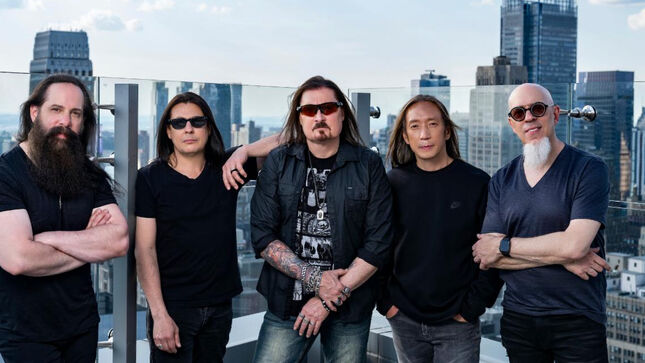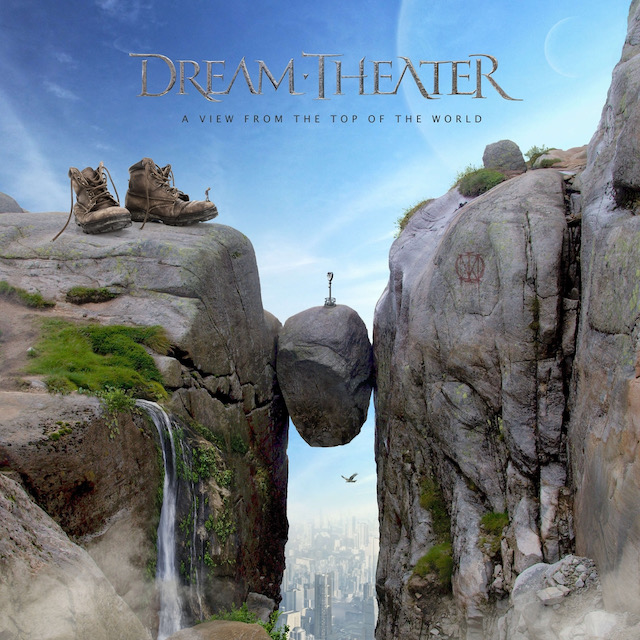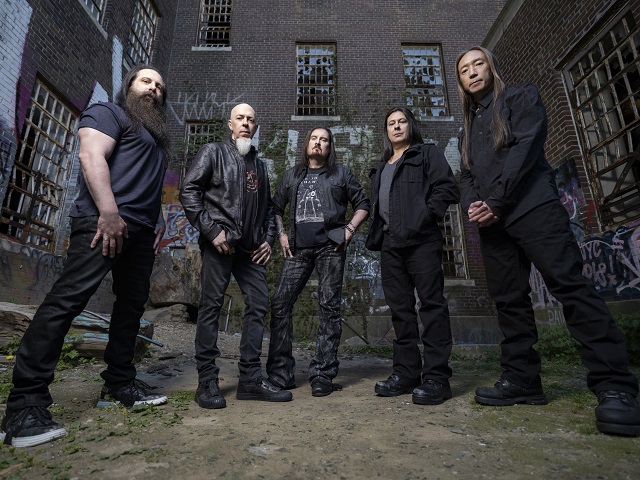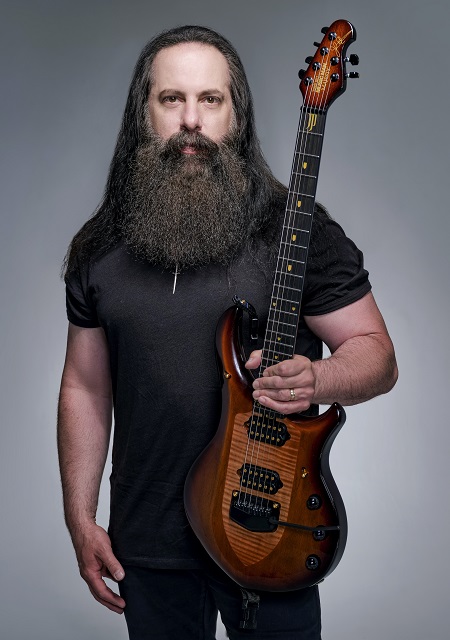DREAM THEATER – The Alien, The Monster, And The Masters
November 16, 2021, 3 years ago

Every Dream Theater album seems to receive and equal amount of praise and scorn upon release, but A View From The Top Of The World has enjoyed much more of the former. There have been the expected moans and groans about the band once again taking their prog metal-isms too far - first single "The Alien" on its own isn't for the rhythm deaf faint-of-heart - but as an overall package the record has been embraced as one of Dream Theater's strongest in years. Clocking in at over 70 minutes, A View From The Top Of The World is a heavy serving of music that takes several listens to truly appreciate, but once inside it opens up in unexpected ways. For one thing, the seemingly blatant but purely accidental returns to the sound of albums like Images And Words, Awake and Scenes From A Memory are a treat for long time fans. On the other side, the tightened-up songwriting heard on previous album, Distance Over Time, continues on the new album, making for several instantly memorable moments. Something that, for many Dream Theater fans, hasn't happened in years.
Guitarist John Petrucci, who produced A View From The Top Of The World, and vocalist James LaBrie spoke with BraveWords about the album.
BraveWords: Since the album release there have been numerous comments online about the wide use of mid-range vocals rather than your high range. You've received a lot of praise for that. Was that intentional on your part or did it just turn out that way?
LaBrie: "I'm very aware of the sweet spots in my voice, and even though there are songs where I'll sing quite high, sometimes I catch myself and think that singing high actually isn't nearly as good as using my mid-range. I want to give the song exactly what it needs rather than going beyond the call of duty. John mentioned that when we were doing the last album and this one, that I was going for those sweet spots with my voice and that was me experimenting. It's cool and I think it really worked well for the songs."
BraveWords: There are also several moments on the album that call back to the band's early days; guitar and keyboard solo passages, vocal melodies, phrasing and arrangements. I hear bits and pieces of Images And Words and Awake scattered throughout the album. Do you guys notice that, or is it wishful thinking?
Petrucci: "I do hear it, and there are a couple things that happened to influence that. Over the last few years we have done a couple of things that I think brought us to this point. For example, we did the tour celebrating the 30th Anniversary of Images And Words. Then we did the 20th Anniversary tour for Scenes From A Memory. Just doing that reminded us as we were playing those songs on stage of the thought processes when we wrote those songs, and how they differ from what we've written more recently. At the same time, last year I did a solo album, then I got together with Jordan, Tony Levin and Mike Portnoy for Liquid Tension Experiment, and I think all of that awakened these things that are part of our musical DNA. Whether we like it or not, all of that experience was re-awakened somehow. And when we got together to do the new Dream Theater record, it was not at a time when we would normally be out touring. Because we didn't know when we'd be able to go back out we decided to go into the studio, so we didn't have time to overthink the record: 'It's going to be this or that...' We had some thoughts on the direction the album would take, but they went out the window once we started playing together (laughs)."
LaBrie: "There are parts on the new album where people can say 'They've gone back to their roots; I can hear some of the early classic Dream Theater.' When you start playing albums like Scenes From A Memory live beginning to end every single night, you can't help but be affected subconsciously. It kind of resides within you where you appreciate those moments, what you created, the dynamics within that music. It was a bit of a catalyst for A View From The Top Of The World. I'm not saying that was everything that made this album, but to some degree I think we looked at songs that created that initial excitement, so when you hear this album a lot of that stuff - the theatrical bits, the bombastic parts, how we let sections breathe - is going on."
Petrucci: "We just decided to see what would happen, not putting rules on anything, so it wasn't intentional to go back to the early days. It was more like a stream of consciousness, but because we did all of these different things over the last few years all that stuff was swimming around in our heads."
"When we get together to write and those moments happen, we're so proud of them. It feels like... so us. We have so much confidence and anticipation of people hearing it. People that have known Dream Theater for a long time and love that part of our history identify with it immediately. The funny thing is, some people think we sound too much like ourselves, which I've always thought is a weird reaction (laughs). What should we sound like?"

BraveWords: Dream Theater is at that point in its career where you have to straddle that line between remaining fresh and staying true to your legacy.
Petrucci: "It's not really how we think. We don't get caught up in thinking about outside opinions because we're creating art, we're working with musicians we respect and love to play with and create with. When you're in that moment, that's what matters."
BraveWords: There's no mistaking the Rush flavour of "Transcending Time", which makes it the oddball track on the record, but it works. It's reminiscent of James' cover of "Red Barchetta" from the Working Man tribute album (from 1996).
Petrucci: "First of all, I'm a huge Rush fan, as most people know. They're my favourite band in the world if I had to pick one. That song is highly influenced by that side of Rush's writing, which I've always been intrigued by. It's almost easier to write stuff that's darker and progressive; that kinda just comes out. But to write something that will fit in with the landscape of the record, in a major key, and not have people going 'What they hell were they trying to do?' is hard to do. It's a challenge. We've done it a few times on different albums and it's totally influenced by Rush, by Boston, by bands that have managed to do that. The song comes out in such a way that you can't wait to hear that track again, as opposed to it be an obvious attempt at writing a pop song. It doesn't feel like that to me. It feels like it fits right in even though it's different from everything else on the record."
LaBrie: "I remember saying to John when we were recording 'Transcending Time', that every song that we did for the album I was completely jazzed because there was this immediate connection with each one. It was funny because when we went in to do that song, I kept wanting to revisit the melody and John was wondering what was wrong with me because I loved it when we first wrote it. I admit, there was some trepidation there but I didn't know why. I decided to just go in and see how it felt while I was singing it, figuring that if John and I loved it before we would still love it, and sure enough it hit just right."

BraveWords: Just a personal hang-up - and maybe I'm alone in this - but I felt for the longest time that Dream Theater forgot how to write actual songs. Probably from Systematic Chaos (2007) onward, it felt like a lot of the songs were just kinda "there", meandering from one to the next. The last album and this new one feel complete, compact, whole. If that makes sense....
LaBrie: "Dream Theater is progressive and metal, first and foremost, and I think what we found on these last two albums is a definite cohesiveness between those two elements. Everything else that's thrown into the pot keeps us sounding very eclectic."
Petrucci: "I appreciate you saying that. We try our best within the style and package that is Dream Theater, we're always trying to write songs. Sometimes we hit that mark better than at other times. On Distance Over Time, it was something that we consciously tried to focus even more on making the songs concise presentations. On the new album we didn't put those restrictions on ourselves, but those writing muscles that we exercised on the last album seeped into this one."
"I can listen to a lot of technical music and be impressed by guitar playing and a lot of different things, but the music that makes up the fabric of my memories and the music I want to listen to is always song-based. You have your favourite songs, and you'll find yourself quoting lyrics and singing certain moments, and that connection is what it's all about. That's something that's always been important to us."
LaBrie: "I think every band experiments, especially when you've been in the business as long as we have. Some chapters in your life may not resonate as strongly as previous ones did. I think there are moments in every band's career where your diehard fans are gonna go 'Naaah, I'm not hearing what sparked this whole relationship to begin with.' And that's fine because if a band doesn't experiment and push those boundaries, they're not being creative. Playing it safe, that complacency, it becomes boring. We had to do the albums that we've done. It's very hard for me to be objective because I'm a part of every one of those albums, but on these last two albums there has definitely been a been a rekindling of our entire fanbase. People are feeling the songs the way they used to when they started listening to us at the beginning."
BraveWords: Was it difficult working remotely from DTHQ with James being at home in Canada?
Petrucci: "He said it was better (laughs)."
LaBrie: "I could hear everything through the speakers; all their instruments sounded like they were in the room. It was amazing. In previous years I'd be sitting in a room with headphones on, microphone in front of me, and doing my parts, so if anything there was an advantage to doing things this way because I could just hit the mute button while they were working parts out, and I could do the same. For me the environment didn't really change."
"It was funny, though, because here we are in the middle of a pandemic and I decided to stay home when we wrote the album, but we decided to get together to record my vocals because we hadn't done it in so long (laughs). It was great because John and I haven't recorded that way since Black Clouds And Silver Linings. It was cool to have that bond, and it was great because before we went in to record we'd go over the songs with John playing them acoustic and me singing to make sure the melodies sounded right. You're always changing things at the last minute, because it's not until I'm behind the mic and I come up to those sections where I think 'We need to tweak this because it doesn't sound like what we heard in our heads."

BraveWords: How does it feel being at the 30+ Anniversary mark in the band's career, and 15 albums in?
Petrucci: "It constantly freaks me out, absolutely. I think about being a kid and wanting to have a career in music, wanting to be the next Rush or Iron Maiden, and about how the odds of having a career like that are so slim. The milestones and achievements along the way, especially playing the kind of music that we play, it's crazy. I don't take any of it for granted."
(Photos by: Rayon Richards)











